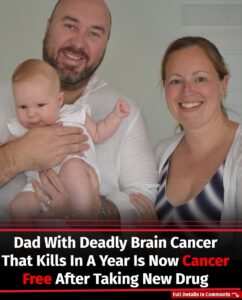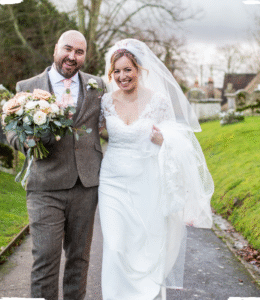Dad Defies Deadly Brain Cancer Thanks to Groundbreaking Drug – Now He’s Tumor-Free

A life-threatening diagnosis turned into a story of hope for one UK father after a pioneering treatment cleared him of brain cancer.
Glioblastoma is known as one of the most severe and fast-moving forms of brain cancer, often leaving patients with a grim prognosis. Each year, over 10,000 lives are lost to it in the U.S. alone. Once diagnosed, many are told they have less than a year to live.
That was the case for Ben Trotman, who was told in October 2022—at just 40 years old—that he had glioblastoma.
A New Drug Brings New Hope
Treatment for glioblastoma usually involves removing the tumor through surgery, followed by radiation and chemotherapy. But researchers at University College London Hospitals (UCLH) are testing a different approach—one that might change the odds.
In a new clinical study, a promising immunotherapy drug called ipilimumab—marketed as Yervoy—is being used in an innovative way: before any traditional treatments begin. The drug, a monoclonal antibody, trains the immune system to identify and fight off cancer cells.
The trial’s lead, oncologist Dr. Paul Mulholland, explained:
“This trial is unique in that we’re administering the immunotherapy upfront—while patients are still well enough to handle it—before any other treatments begin.”
And so far, results are astonishing. Ben, the first person in the trial, has shown no signs of cancer recurrence more than two and a half years after taking ipilimumab.
A Remarkable Recovery
When Ben was first diagnosed, he and his wife Emily were devastated.
“It was like the world stopped,” she said. “We went from thinking everything was normal to hearing that Ben might only have months.”
But after joining the study and receiving ipilimumab, Ben went on to receive radiation and chemotherapy. He never had the follow-up surgery originally scheduled to remove the rest of his tumor.
And yet, his scans have been clear ever since.
“It’s extremely rare to see a completely clean scan with glioblastoma,” said Dr. Mulholland. “Especially when part of the tumor remained untouched by surgery.”
A New Chapter of Life
In January 2023, just a few months after beginning treatment, Ben and Emily were married. This year, they welcomed their daughter, Mabel. These days, the family spends time outdoors, often joined by their rescue dog, Jerry.
“We’re trying to hold on to normalcy,” Emily shared. “We don’t know what the future holds, but we want to make the most of each day and believe we have a future to plan for.”
Expanding the Study
Following Ben’s success, researchers are hoping to enroll at least 16 more glioblastoma patients in the trial over the next 18 months. Like Ben, they’ll start with ipilimumab and then proceed with the standard cancer treatments. Surgery may also be an option, depending on individual cases.
Backing this groundbreaking effort is Dame Siobhain McDonagh, a UK Member of Parliament whose sister Margaret died from glioblastoma in 2023. McDonagh, who is helping fund the research, said:
“My sister was shocked to find out how little progress had been made in brain cancer treatment. Supporting this trial is a way to carry forward her final mission.”
All trial procedures are being carried out at the NIHR UCLH Clinical Research Facility, based at the National Hospital for Neurology and Neurosurgery.
Ben, now a symbol of what’s possible, said he’s thrilled the trial is growing:
“Knowing others will get a shot at this treatment gives me so much hope. No one should be left without options.”
